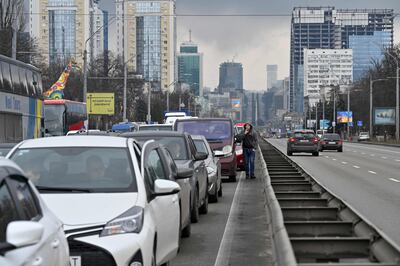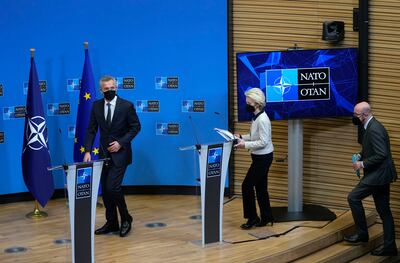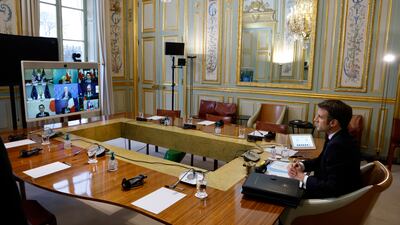Live updates: follow the latest news on Russia-Ukraine
EU leaders approved a new set of sanctions that will restrict Russia’s access to Europe’s financial sector and key technology.
The measures, which could be formally adopted as soon as Friday after officials hammer out final details, came after similar expanded sanctions were announced in the UK and the US.
“The European Council today agrees on further restrictive measures that will impose massive and severe consequences on Russia for its action, in close co-ordination with our partners and allies,” a report from the online summit said.
“These sanctions cover the financial sector, the energy and transport sectors, dual-use goods, as well as export control and export financing, visa policy, additional listings of Russian individuals and new listing criteria.”
The EU’s 27 leaders met in Brussels after the G7 talks to discuss tightening sanctions, a few hours after a previous round of measures took effect in a failed attempt to deter Russian aggression.
They agreed on sanctions that are aimed at 70 per cent of the Russian banking market and key state-owned companies, including in the defence sector, EU Commission President Ursula von der Leyen said in a tweet early on Friday.
Leaders of the G7 countries held afternoon talks as explosions and artillery fire rang out in Ukraine, with another round of sanctions on the way, which the EU said would degrade Russia’s economy and technological prowess.
The leaders of the G7 wealthy democracies called on countries outside the group to “raise their voice" over a crisis that had “ramifications well beyond Europe”, in what western capitals regard as a Russian assault on the international order.
They accused Russian President Vladimir Putin of using “fabricated claims and unfounded allegations” to justify the overnight attack, which he described as an act of self-defence against Nato.
“President Putin has reintroduced war to the European continent,” the leaders of the US, Britain, France, Germany, Italy, Canada and Japan said. “He has put himself on the wrong side of history.”
Although there was no appetite among western leaders for direct war with Russia, Britain said it would increase support for Ukraine, and Nato promised to shore up its eastern flank with land and air forces.
“Diplomatically, politically, economically and, eventually, militarily, this hideous and barbaric venture of Vladimir Putin must end in failure,” UK Prime Minister Boris Johnson said.
Nato will take up the baton on Friday with talks among its 30 allies, as well as non-members Sweden and Finland, whose status has taken on a greater significance as Russia demands a ban on further expansion.
Secretary General Jens Stoltenberg said Moscow's invasion shook the foundations of the European security order and was an attempt to “turn the clock back by force” after Mr Putin repeatedly spoke of Russia’s historic control of what is now Ukraine.
The promise of further sanctions “sends a strong message of unity and it demonstrates how alone and isolated Russia is”, Mr Stoltenberg said.
There were separate diplomatic pleas to Belarus, from which some of the Russian troops attacked, to sever ties with Mr Putin after Nato members condemned it for enabling the invasion.
G7 leaders said the latest batch of measures would make Russia a pariah state, suppress its economic growth and eventually leave its people turning to Mr Putin for answers.
Ms von der Leyen said the draft package would cut off Russia from financial markets, increasing its borrowing costs and driving up inflation.
“We want to cut off Russia’s industry from the technologies desperately needed today to build a future,” she said. “It is President Putin who will have to explain this to his citizens.”
After weeks of warnings that an invasion could be coming, Ms von der Leyen said there were “explicit contingency plans” with frontline countries such as Poland to absorb a potential wave of refugees.
Although European leaders hope there will be as few migrants as possible, countries “are fully prepared for them and they are welcome”, she said.
There were traffic jams on Kiev's roads and long queues at petrol stations in Ukraine after the Russian invasion began.

German Chancellor Olaf Scholz, who was chairing the G7 talks, said the aim of the sanctions was to “make clear to the Russian leadership that it will pay a bitter price for this aggression”.
“It will become clear that Putin has made a grave mistake with this war,” Mr Scholz said in Berlin.
He eased some of his allies' concerns about Germany's stance on Russia this week by moving to suspend the Nord Stream 2 gas pipeline indefinitely.
But he was told in a call by Mr Johnson on Thursday that the “strongest possible sanctions” were now needed, Downing Street said.
In Britain, where many were left underwhelmed by an initial round of sanctions against three people and five banks, Mr Johnson said the package from western allies was “designed in time to hobble the Russian economy”.
There have long been calls to clean London and the UK of suspect Russian money after decades of investment by wealthy businessmen with ties to the Kremlin.
Outside the G7 bloc, Australia imposed another batch of sanctions hitting 25 Russian army commanders and four entities involved in the sale of military technology.
But Ukraine pleaded with countries to go further by moving, as it did on Thursday, to cut off diplomatic relations with Russia.
Other possibilities not previously used by western leaders would include sanctions against Mr Putin or cutting Russia out of the global Swift payments system.
Ukrainian Foreign Minister Dmytro Kuleba also called for weapons and equipment for Ukraine, while accepting that Nato countries would not fight Russia directly because Kiev is not a member of the alliance.
“The world can and must stop Putin,” Mr Kuleba said. “The time to act is now.”

How world leaders reacted to the invasion
G7 leaders' joint statement
“This has fundamentally changed the Euro-Atlantic security situation. President Putin has reintroduced war to the European continent. He has put himself on the wrong side of history.”
Boris Johnson, UK Prime Minister
“This act of wanton and reckless aggression is an attack not just on Ukraine. It is an attack on democracy and freedom in Eastern Europe and around the world. This crisis is about the right of a free, sovereign, independent European people to choose their own future and that is a right that the UK will always defend.”
Olaf Scholz, German Chancellor
“Putin is bringing suffering and destruction to his immediate neighbours. He is violating the sovereignty and the borders of Ukraine. He is endangering the lives of countless innocent people in Ukraine, the brother folk of Russia. He is also throwing the peaceful order of our continent into doubt. There is no justification for any of this. This is Putin’s war.”
Emmanuel Macron, French President
“Last night's events are a turning point in the history of Europe and of our country. They will have lasting, profound consequences on our lives. They will have consequences on the geopolitics of our continent and we will respond to them together.”
Joe Biden, US President
“President Putin has chosen a premeditated war that will bring a catastrophic loss of life and human suffering. Russia alone is responsible for the death and destruction this attack will bring.”
Charles Michel, European Council President
“Last night, a cataclysm shook Europe — a brutal aggression triggered by Vladimir Putin and the Kremlin against human beings. This unprovoked and unjustified attack is unlike anything on European soil since the end of the Second World War.”

































































